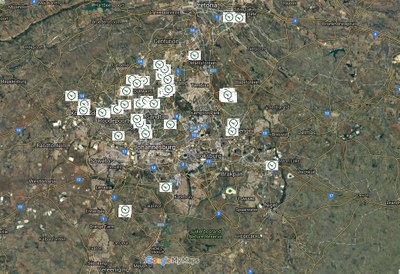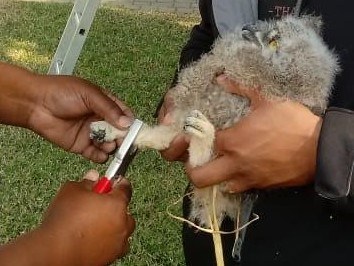

|
As hungry as a bat This video was taken from one of our EcoSolutions Bat Banks. It's clear to see that this is pest control in action. |
||
 |
||
|
The 150 or so Angolan free-tailed bats (Mops condylurus) emerging from this bat bank can consume up to 70% of their own body weight nightly. This translates into almost 2.5kg of insects consumed by this roost every night. The annual insect consumption for a roost this size? Almost a tonne of insects a year! Pesticide free choices. Perfect for stables, parks, estates and farms. Read more... |
||
 |
 |
 |
|
Winter - baby-making weather for Bubo africanus The winter solstice is significant for Spotted Eagle Owls (Bubo africanus) as the change in the photoperiod acts as the hormonal trigger that "kicks" them into their breeding season. Over 100 families in Gauteng have occupied owl boxes and enjoy this event each year. Their owl boxes are serviced annually to ensure that they remain viable for owl occupation and for the female owl to raise her young. If your owl box hasn’t been serviced yet, there is still time. Let's arrange it today. Book your service... |
||
_216x162.jpg) |
_216x162.jpg) |
 |
|
Rats! Don’t reach for poison… The old adage “prevention is better than cure” is nowhere more applicable than in our struggle to control rodents within our homes. Excluding rodents from our home offers a far more permanent and environmentally friendly manner in which to deal with our unwanted rodent visitors. Generally, when we are confronted with a rodent influx, we want them gone and we want them gone quickly. Reaching for a box of rat poison has become almost second nature to us. However, it is not environmentally friendly and as importantly, it is not a long term sustainable solution. There is an alternative to rat poison. Find out more... |
||
 |
 |
 |
|
Owls breeding in a chimney - no need for 'rescue'! A frequent story - last week we received a call from a homeowner in Kempton Park with owls breeding in his chimney. He did not want the owls harmed - he just needed a solution. When the EcoSolutions team arrived, they found a clutch of 2 owlets with the female keeping a close eye from a nearby tree. The owlets were healthy, mum was in attendance, it was just the site that was a bit dodgy. What to do? Simple. Move the chicks to an owl box. That is what we always do. After ringing the owlets, they were placed in an EcoSolutions owl box in a nearby tree. As soon as the team had climbed down the ladder, the mother owl was in the box to check out the chicks and the new digs. She approved and has been feeding and caring for the owlets ever since. There is almost never a need to remove owlets from their parents. It robs owls of their young and places the "rescued" chicks in jeopardy. |
||
 |
||
|
SPCA It is Spotted Eagle Owl breeding season again. It is at this time that we receive numerous calls from members of the public who have encountered young owls on the ground. This is perfectly natural for our urban owlets. The parents are vigilant and continue to feed and protect. Within a few days, the owlets are airborne and life continues. Unfortunately, this is also the time when owlets are most in danger of being "rescued". It really isn't necessary. If you really feel that the owl or owlet is in jeopardy and that an expert should get involved, please contact your nearest SPCA. The NSPCA has a database of all of their accredited rehabilitation centres. This is important. The NSPCA accreditation lets you know that a rehabilitation centre adheres to an acceptable standard of animal welfare. As we all know, Facebook pages and websites can be misleading. The NSPCA accreditation process is comprehensive and is the ONLY way to make certain that you are dealing with an ethical and responsible organisation. For those of you who donate to rehabilitation centres, it is perhaps worthwhile to check your chosen organisation on the NSPCA accreditation list. |
||